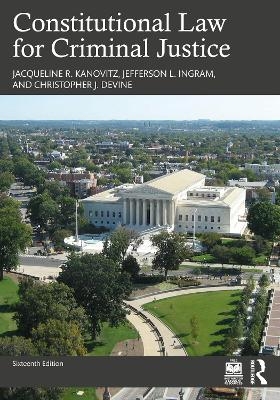
Constitutional Law for Criminal Justice
Routledge (Verlag)
978-1-032-16123-5 (ISBN)
Constitutional Law for Criminal Justice, Sixteenth Edition, offers criminal justice professionals the training they need to recognize the constitutional principles that apply to their daily work. Jacqueline R. Kanovitz, Jefferson L. Ingram, and Christopher J. Devine provide a comprehensive, well-organized, and up-to-date analysis of constitutional issues that affect the U.S. justice system.
Chapter 1 of Part I summarizes the organization and content of the Constitution, the Bill of Rights, and the Fourteenth Amendment. The next eight chapters cover the constitutional principles that regulate investigatory detentions, traffic stops, arrests, use of force, search and seizure, technologically assisted surveillance, the Wiretap Act, interrogations and confessions, self-incrimination, witness identification procedures, the right to counsel, procedural safeguards during criminal trials, First Amendment issues relevant to law enforcement, and capital punishment. The final chapter covers the constitutional rights of criminal justice professionals in the workplace, their protection under Title VII of the Civil Rights Act, and their accountability under 42 U.S.C. § 1983 for violating the constitutional rights of others. Part II contains abstracts of key judicial decisions exemplifying how the doctrines covered in earlier chapters are being applied by the courts. The combination of text and cases creates flexibility in structuring class time.
This book makes complex concepts accessible to students in all levels of criminal justice education. The chapters begin with an outline and end with a summary. Key Terms and Concepts are defined in the Glossary. Tables, figures, and charts are used to synthesize and simplify information. The result is an incomparably clear, student-friendly textbook that has remained a leader in criminal justice education for more than 50 years.
The accompanying Instructor and Student Resource website provides free digital materials designed to test student knowledge and save time when preparing lessons. Resources include:
Student access to practical quizzes including multiple-choice and true-or-false questions, and case studies with interactive questions and answers to test and apply knowledge
A downloadable comprehensive study guide, glossary, and appendix including the text of the United States Constitution to enhance understanding of each chapter alongside study
Step-by-step Instructor Guides and premade lesson slides that correspond to the chapters in an editable format to saving valuable time on lesson preparation
Instructor access to test-bank questions for further exam practice
Password-protected instructor resources available on the Instructor Resources Download Hub
Jacqueline R. Kanovitz most recently was an emeritus professor at the Brandeis School of Law, where she taught for 30 years and served as Associate Dean for Student Affairs. She also taught at other law schools. She held a J.D. (summa cum laude) from the University of Louisville School of Law. She was the recipient of numerous awards for teaching and writing excellence and co-authored this textbook from its first edition in 1968 until her death in 2017. Jefferson L. Ingram holds the rank of professor in the Department of Political Science at the University of Dayton. He has a B.S. in secondary education, an M.A. in American history, and a Juris Doctor. He is a member of the Ohio Bar, the Florida Bar, the bar of the federal courts for the Southern District of Ohio, and the Bar of the Supreme Court of the United States. Christopher J. Devine is an associate professor of political science at the University of Dayton. He earned his M.A. and Ph.D. in political science at The Ohio State University, and his B.A. in government and English at Connecticut College. He has published research on the U.S. presidency and vice presidency, political parties, public opinion, and voting behavior. He has taught courses on these topics, as well as constitutional law, at the University of Dayton.
PART I Textual Presentation of Constitutional Principles for Criminal Justice Chapter 1 Constitutional History and Content Chapter 2 Freedom of Speech Chapter 3 Authority to Detain and Arrest Chapter 4 Search and Seizure Chapter 5 Laws Governing Police Surveillance Chapter 6 Interrogations and Confessions Chapter 7 Compulsory Self-Incrimination Chapter 8 Right to Counsel Chapter 9 Trial and Punishment Chapter 10 Rights and Liabilities in the Workplace PART II Judicial Decisions and Statutes Relating to Part I
| Erscheinungsdatum | 24.01.2024 |
|---|---|
| Zusatzinfo | 17 Tables, black and white; 1 Line drawings, black and white; 1 Halftones, black and white; 2 Illustrations, black and white |
| Verlagsort | London |
| Sprache | englisch |
| Maße | 178 x 254 mm |
| Gewicht | 1655 g |
| Themenwelt | Recht / Steuern ► EU / Internationales Recht |
| Recht / Steuern ► Öffentliches Recht | |
| Recht / Steuern ► Strafrecht ► Kriminologie | |
| Recht / Steuern ► Strafrecht ► Strafverfahrensrecht | |
| ISBN-10 | 1-032-16123-X / 103216123X |
| ISBN-13 | 978-1-032-16123-5 / 9781032161235 |
| Zustand | Neuware |
| Informationen gemäß Produktsicherheitsverordnung (GPSR) | |
| Haben Sie eine Frage zum Produkt? |
aus dem Bereich


